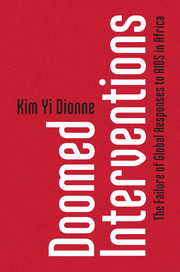Book contents
- Frontmatter
- Dedication
- Contents
- List of Figures
- List of Tables
- Acknowledgments
- 1 Misaligned Priorities: How Disconnect between Donors and Citizens Doomed AIDS Intervention in Africa
- 2 AIDS in Africa: A Significant Challenge and a Disconnected Response
- 3 Principal–Agent Problems and AIDS Interventions in Africa
- 4 AIDS in Malawi
- 5 Policy Priorities in the Time of AIDS
- 6 Seeing Like a Village: Headmen as Agents of the Global AIDS Intervention
- 7 Conclusion
- Bibliography
- Index
2 - AIDS in Africa: A Significant Challenge and a Disconnected Response
Published online by Cambridge University Press: 28 November 2017
- Frontmatter
- Dedication
- Contents
- List of Figures
- List of Tables
- Acknowledgments
- 1 Misaligned Priorities: How Disconnect between Donors and Citizens Doomed AIDS Intervention in Africa
- 2 AIDS in Africa: A Significant Challenge and a Disconnected Response
- 3 Principal–Agent Problems and AIDS Interventions in Africa
- 4 AIDS in Malawi
- 5 Policy Priorities in the Time of AIDS
- 6 Seeing Like a Village: Headmen as Agents of the Global AIDS Intervention
- 7 Conclusion
- Bibliography
- Index
Summary
AIDS is everywhere, either in rich or poor countries. Young or old people … people are dying with AIDS everyday.
Malawian Journals Project, Graciano Magwira, August 11, 2005AIDS took the lives of 1 million people in 2016, more than twothirds of whom lived in Africa. Although Africa has only 16% of the world's population, it is home to 65% of all new HIV infections. This chapter describes both the challenge AIDS has been in Africa as well as the responses to AIDS by ordinary Africans, their governments, and the greater international community. Because evaluating HIV/AIDS interventions requires a general understanding of HIV prevalence and transmission patterns, I start with a brief overview of the AIDS epidemic in Africa. I then describe responses to AIDS, including local community responses and large global initiatives. The next section highlights the disconnect between interventions as imagined in global capitals and as actually implemented at the grassroots level. The final section examines why there is a disconnect and proposes how to explain it.
HIV/AIDS in Africa: A Brief Overview
HIV is the acronym for human immunodeficiency virus, a virus that causes acquired immunodeficiency syndrome, or AIDS. Progression from HIV infection to AIDS disease is long, usually taking 8 to 12 years in the absence of treatment. Although people may experience mild symptoms immediately after infection, there is a long latent phase before AIDS weakens the immune system. AIDS makes the body less capable of fighting infections and ultimately leads to death from opportunistic infections. There is no vaccine for HIV and there is no cure for AIDS.
HIV is a global pathogen with African roots. The original discovery of the virus in the 1980s is credited to laboratories in the United States and France (Epstein, 1996; Crane, 2013), but the most detailed analysis suggests the virus’ origins lie somewhere in Central Africa (Vidal et al., 2000; Iliffe, 2006; Pepin, 2011), where some of the earliest evidence of HIV has been found (Nahmias et al., 1986; Worobey et al., 2008). Scientists estimate HIV was “circulating in the African population near the beginning of the 20th century” (Worobey et al., 2008, 663).
- Type
- Chapter
- Information
- Doomed InterventionsThe Failure of Global Responses to AIDS in Africa, pp. 13 - 38Publisher: Cambridge University PressPrint publication year: 2017



